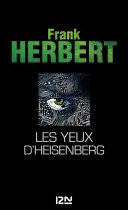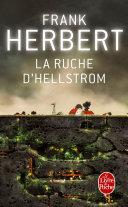Œuvres

La Mort blanche
Frank Herbert
Les Yeux d'Heisenberg
Frank Herbert
La Ruche d'Hellstrom
Frank HerbertDune
Frank HerbertFrank Herbert citations célèbres
“Les peuples vaincus essaient toujours de compenser par des mythes et des légendes.”
La Mort blanche, 1982
Frank Herbert Citations
“L'usage du pouvoir exige une certaine mesure d'inhumanité.”
La Mort blanche, 1982
“La pitié est un sentiment inutile.”
Les Yeux d'Heisenberg, 1966
“La couleur d'un poisson ne le rend pas moins poisseux.”
La Mort blanche, 1982
“L'adoration est produite par la peur.”
Les Yeux d'Heisenberg, 1966
“Toutes les monstruosités ont leurs euphémismes.”
La Mort blanche, 1982
“L’Église a suffisamment péché en se réclamant de Dieu pour bénir le meurtre.”
La Mort blanche, 1982
La Ruche d'Hellstrom, 1973
“Importe-t-il à la fourmi de savoir à qui appartient le pied qui l'écrase?”
La Mort blanche, 1982
“La plus puissante force de sociabilisation dans l'univers est la dépendance mutuelle.”
La Ruche d'Hellstrom, 1973
“Quand vous bravez la mort, en quoi est-ce différent d'un suicide délibéré?”
La Mort blanche, 1982
“La prohibition renforce toujours ce qu'elle interdit.”
La Mort blanche, 1982
Frank Herbert: Citations en anglais
“Seek freedom and become captive of your desires. Seek discipline and find your liberty.”
Source: Chapterhouse: Dune
“A man is a fool not to put everything he has, at any given moment, into what he is creating”
As quoted in Shoptalk: learning to write with writers (1990), edited by Donald Morison Murray<!-- Cook Publishers -->
General sources
Contexte: A man is a fool not to put everything he has, at any given moment, into what he is creating. You're there now doing the thing on paper. You're not killing the goose, you're just producing an egg. So I don't worry about inspiration, or anything like that. It's a matter of just sitting down and working. I have never had the problem of a writing block. I've heard about it. I've felt reluctant to write on some days, for whole weeks, or sometimes even longer. I'd much rather go fishing, for example, or go sharpen pencils, or go swimming, or what not. But, later, coming back and reading what I have produced, I am unable to detect the difference between what came easily and when I had to sit down and say, 'Well, now it's writing time and now I'll write.' There's no difference on paper between the two.
Dune Genesis (1980)
Contexte: In the beginning I was just as ready as anyone to fall into step, to seek out the guilty and to punish the sinners, even to become a leader. Nothing, I felt, would give me more gratification than riding the steed of yellow journalism into crusade, doing the book that would right the old wrongs.
Reevaluation raised haunting questions. I now believe that evolution, or deevolution, never ends short of death, that no society has ever achieved an absolute pinnacle, that all humans are not created equal. In fact, I believe attempts to create some abstract equalization create a morass of injustices that rebound on the equalizers. Equal justice and equal opportunity are ideals we should seek, but we should recognize that humans administer the ideals and that humans do not have equal ability.
“No matter how finely you subdivide time and space, each tiny division contains infinity.”
Dune Genesis (1980)
Contexte: No matter how finely you subdivide time and space, each tiny division contains infinity.
But this could imply that you can cut across linear time, open it like a ripe fruit, and see consequential connections. You could be prescient, predict accurately. Predestination and paradox once more.
The flaw must lie in our methods of description, in languages, in social networks of meaning, in moral structures, and in philosophies and religions — all of which convey implicit limits where no limits exist. Paul Muad'Dib, after all, says this time after time throughout Dune.
Dune Genesis (1980)
Contexte: Don't give over all of your critical faculties to people in power, no matter how admirable those people may appear to be. Beneath the hero's facade you will find a human being who makes human mistakes. Enormous problems arise when human mistakes are made on the grand scale available to a superhero. And sometimes you run into another problem.
It is demonstrable that power structures tend to attract people who want power for the sake of power and that a significant proportion of such people are imbalanced — in a word, insane. … Heroes are painful, superheroes are a catastrophe. The mistakes of superheroes involve too many of us in disaster.
It is the systems themselves that I see as dangerous.
"Science Fiction and a World in Crisis" in Science Fiction: Today and Tomorrow (1974) edited by Reginald Bretnor
General sources
Contexte: The current utopian ideal being touted by people as politically diverse (on the surface, but not underneath) as President Richard M. Nixon and Senator Edward M. Kennedy goes as follows — no deeds of passion allowed, no geniuses, no criminals, no imaginative creators of the new. Satisfaction may be gained only in carefully limited social interactions, in living off the great works of the past. There must be limits to any excitement. Drug yourself into a placid "norm." Moderation is the key word…
"Science Fiction and a World in Crisis" in Science Fiction: Today and Tomorrow (1974) edited by Reginald Bretnor
General sources
Contexte: By the time we awaken faintly to the awareness that we have been socially conditioned, we find ourselves so indoctrinated that it's difficult, if not impossible, to break the old patterns … Survival pressures demanding that we evolve, grow, and change, however, continue to proliferate. We don't want to change, but the floodgates open abruptly and we are overwhelmed.
Crisis!
“It is the systems themselves that I see as dangerous.”
Dune Genesis (1980)
Contexte: Don't give over all of your critical faculties to people in power, no matter how admirable those people may appear to be. Beneath the hero's facade you will find a human being who makes human mistakes. Enormous problems arise when human mistakes are made on the grand scale available to a superhero. And sometimes you run into another problem.
It is demonstrable that power structures tend to attract people who want power for the sake of power and that a significant proportion of such people are imbalanced — in a word, insane. … Heroes are painful, superheroes are a catastrophe. The mistakes of superheroes involve too many of us in disaster.
It is the systems themselves that I see as dangerous.
Dune Genesis (1980)
Contexte: Don't give over all of your critical faculties to people in power, no matter how admirable those people may appear to be. Beneath the hero's facade you will find a human being who makes human mistakes. Enormous problems arise when human mistakes are made on the grand scale available to a superhero. And sometimes you run into another problem.
It is demonstrable that power structures tend to attract people who want power for the sake of power and that a significant proportion of such people are imbalanced — in a word, insane. … Heroes are painful, superheroes are a catastrophe. The mistakes of superheroes involve too many of us in disaster.
It is the systems themselves that I see as dangerous.
“It is not that power corrupts but that it is magnetic to the corruptible.”
Source: General sources, Chapterhouse Dune (1985)
Contexte: All governments suffer a recurring problem: Power attracts pathological personalities. It is not that power corrupts but that it is magnetic to the corruptible. Such people have a tendency to become drunk on violence, a condition to which they are quickly addicted.
“There is no escape—we pay for the violence of our ancestors.”
Source: Dune
“Without change something sleeps inside us, and seldom awakens. The sleeper must awaken.”
Variante: Without new experiences, something inside of us sleeps. The sleeper must awaken.
Source: Dune
“The gift of words is the gift of deception and illusion.”
Source: Children of Dune
Variante: It is difficult to live in the present, pointless to live in the future and impossible to live in the past.
Source: Dune
"The Plowboy Interview: Frank Herbert", in Mother Earth News No. 69 (May/June 1981)
General sources
“The purpose of argument is to change the nature of truth.”
Source: Children of Dune
“Power attracts the corruptible. Suspect any who seek it.”
Source: Chapterhouse: Dune
